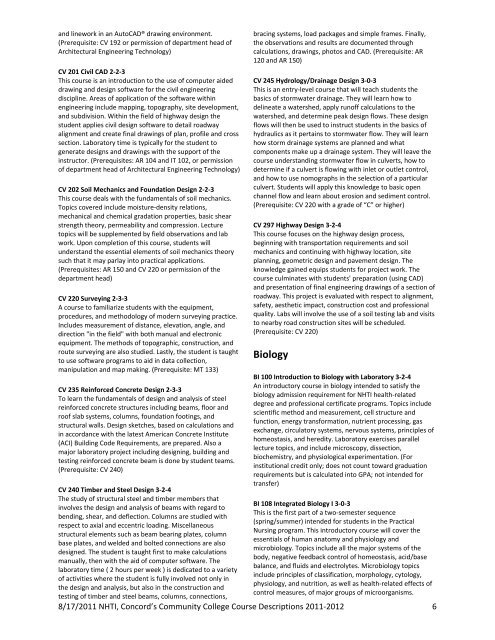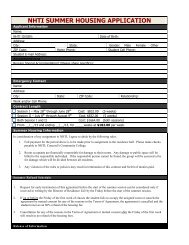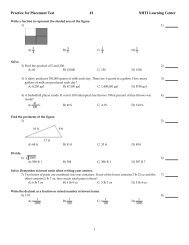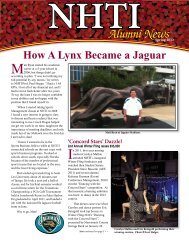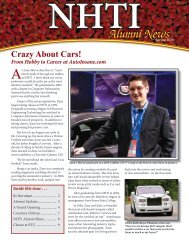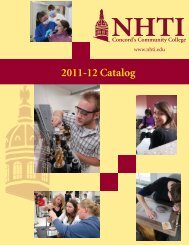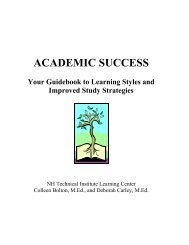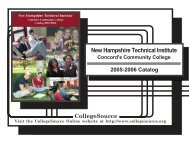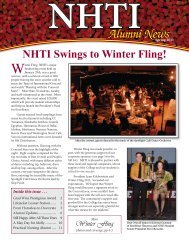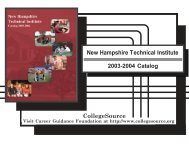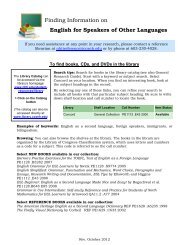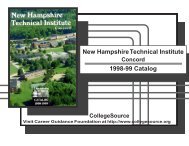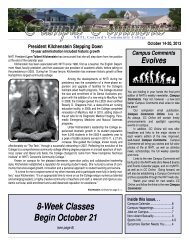Course Descriptions 11-12 - NHTI - Concord's Community College
Course Descriptions 11-12 - NHTI - Concord's Community College
Course Descriptions 11-12 - NHTI - Concord's Community College
- No tags were found...
You also want an ePaper? Increase the reach of your titles
YUMPU automatically turns print PDFs into web optimized ePapers that Google loves.
and linework in an AutoCAD® drawing environment.(Prerequisite: CV 192 or permission of department head ofArchitectural Engineering Technology)CV 201 Civil CAD 2-2-3This course is an introduction to the use of computer aideddrawing and design software for the civil engineeringdiscipline. Areas of application of the software withinengineering include mapping, topography, site development,and subdivision. Within the field of highway design thestudent applies civil design software to detail roadwayalignment and create final drawings of plan, profile and crosssection. Laboratory time is typically for the student togenerate designs and drawings with the support of theinstructor. (Prerequisites: AR 104 and IT 102, or permissionof department head of Architectural Engineering Technology)CV 202 Soil Mechanics and Foundation Design 2-2-3This course deals with the fundamentals of soil mechanics.Topics covered include moisture-density relations,mechanical and chemical gradation properties, basic shearstrength theory, permeability and compression. Lecturetopics will be supplemented by field observations and labwork. Upon completion of this course, students willunderstand the essential elements of soil mechanics theorysuch that it may parlay into practical applications.(Prerequisites: AR 150 and CV 220 or permission of thedepartment head)CV 220 Surveying 2-3-3A course to familiarize students with the equipment,procedures, and methodology of modern surveying practice.Includes measurement of distance, elevation, angle, anddirection "in the field" with both manual and electronicequipment. The methods of topographic, construction, androute surveying are also studied. Lastly, the student is taughtto use software programs to aid in data collection,manipulation and map making. (Prerequisite: MT 133)CV 235 Reinforced Concrete Design 2-3-3To learn the fundamentals of design and analysis of steelreinforced concrete structures including beams, floor androof slab systems, columns, foundation footings, andstructural walls. Design sketches, based on calculations andin accordance with the latest American Concrete Institute(ACI) Building Code Requirements, are prepared. Also amajor laboratory project including designing, building andtesting reinforced concrete beam is done by student teams.(Prerequisite: CV 240)bracing systems, load packages and simple frames. Finally,the observations and results are documented throughcalculations, drawings, photos and CAD. (Prerequisite: AR<strong>12</strong>0 and AR 150)CV 245 Hydrology/Drainage Design 3-0-3This is an entry-level course that will teach students thebasics of stormwater drainage. They will learn how todelineate a watershed, apply runoff calculations to thewatershed, and determine peak design flows. These designflows will then be used to instruct students in the basics ofhydraulics as it pertains to stormwater flow. They will learnhow storm drainage systems are planned and whatcomponents make up a drainage system. They will leave thecourse understanding stormwater flow in culverts, how todetermine if a culvert is flowing with inlet or outlet control,and how to use nomographs in the selection of a particularculvert. Students will apply this knowledge to basic openchannel flow and learn about erosion and sediment control.(Prerequisite: CV 220 with a grade of “C” or higher)CV 297 Highway Design 3-2-4This course focuses on the highway design process,beginning with transportation requirements and soilmechanics and continuing with highway location, siteplanning, geometric design and pavement design. Theknowledge gained equips students for project work. Thecourse culminates with students' preparation (using CAD)and presentation of final engineering drawings of a section ofroadway. This project is evaluated with respect to alignment,safety, aesthetic impact, construction cost and professionalquality. Labs will involve the use of a soil testing lab and visitsto nearby road construction sites will be scheduled.(Prerequisite: CV 220)BiologyBI 100 Introduction to Biology with Laboratory 3-2-4An introductory course in biology intended to satisfy thebiology admission requirement for <strong>NHTI</strong> health-relateddegree and professional certificate programs. Topics includescientific method and measurement, cell structure andfunction, energy transformation, nutrient processing, gasexchange, circulatory systems, nervous systems, principles ofhomeostasis, and heredity. Laboratory exercises parallellecture topics, and include microscopy, dissection,biochemistry, and physiological experimentation. (Forinstitutional credit only; does not count toward graduationrequirements but is calculated into GPA; not intended fortransfer)CV 240 Timber and Steel Design 3-2-4The study of structural steel and timber members thatBI 108 Integrated Biology I 3-0-3involves the design and analysis of beams with regard toThis is the first part of a two-semester sequencebending, shear, and deflection. Columns are studied with(spring/summer) intended for students in the Practicalrespect to axial and eccentric loading. MiscellaneousNursing program. This introductory course will cover thestructural elements such as beam bearing plates, columnessentials of human anatomy and physiology andbase plates, and welded and bolted connections are alsomicrobiology. Topics include all the major systems of thedesigned. The student is taught first to make calculationsbody, negative feedback control of homeostasis, acid/basemanually, then with the aid of computer software. Thebalance, and fluids and electrolytes. Microbiology topicslaboratory time ( 2 hours per week ) is dedicated to a varietyinclude principles of classification, morphology, cytology,of activities where the student is fully involved not only inphysiology, and nutrition, as well as health-related effects ofthe design and analysis, but also in the construction andcontrol measures, of major groups of microorganisms.testing of timber and steel beams, columns, connections,8/17/20<strong>11</strong> <strong>NHTI</strong>, Concord’s <strong>Community</strong> <strong>College</strong> <strong>Course</strong> <strong>Descriptions</strong> 20<strong>11</strong>-20<strong>12</strong> 6


